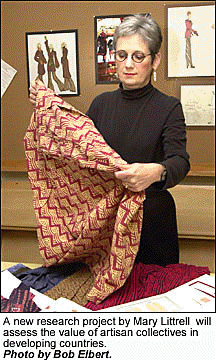Inside Iowa State
October 20, 2000
Recording the process of empowerment
 by Kevin Brown
by Kevin Brown
Impoverished artisans in the Golibar
slums of Mumbai, India (formerly Bombay), are the focus of a
new research project for Mary Littrell, professor of textiles
and clothing.
"We want to see if artisan work is a viable choice for women in developing countries," Littrell said. "We will try to understand how people define well-being in their lives and how to go about achieving that well-being."
Littrell plans to interview, photograph, document, study and track the progress of some of the artisans who make up "MarketPlace: Handwork of India" in Mumbai. The company produces American-tailored textile products using traditional Indian techniques, colors and materials. MarketPlace generated $1.3 million in sales last year, much of which returns to the artisans. Littrell's study will include 130 of the more than 350 artisans in MarketPlace.
After agriculture, Littrell said, income from handcrafts of all types -- including textiles, pottery and artwork -- is the largest source of income for impoverished people in the developing world. By banding together, these artisans are able to tap external markets -- regional, national and global.
However, governments, foundations and researchers disagree on whether these types of entrepreneurial collectives are worth supporting. Some argue that artisans could make more money employed in other fields, such as working in factories.
"Much of the evidence used on both sides of these debates is anecdotal," Littrell said. "This research will be the first attempt to provide empirical data on the long-term, socio- economic impact of artisan work on these people's lives."
Littrell will investigate two key questions:
- How has artisan employment with MarketPlace contributed to enhanced capabilities, livelihood and well- being of women?
- How are artisans' capabilities, livelihood and well- being affected by their participation in centralized (top- down management) versus de-centralized (participatory) organizational structures?
"Finding sustainable employment that contributes to a living wage is extremely difficult for women with limited or no formal education," Littrell said.
They need to learn business-related skills such as reading, keeping financial records, making production planning decisions and developing a product. But some also pick up other skills.
"It can go beyond that to providing the artisans with self- confidence and self-empowerment," she said. "They often learn to speak an opinion to the group itself, to speak for the group, and to help carry out projects successfully."
Littrell said that many of the women who work at MarketPlace are the sole support for their households.
"Their income can make material changes in basic areas such as nutrition, housing and schooling," Littrell said.
Littrell also said artisan groups provide women the ability to "take control" of their lives in ways unavailable before. With a steady, secure source of income, a woman "can 'take' decisions about their lives, not just make them," Littrell said.
"'Taking' is a stronger phrase because they literally do start to take control of their own lives," Littrell said. "The artisans are 'taking' decisions once made by others about the education of their children, about where and how they live, even about what they might wear."
These female artisans also effect changes in their neighborhoods, she said.
"The artisans have tackled issues such as sanitation in their neighbor-hoods," she said. "The women went to city officials and worked with them to have refuse bins placed in the slum and picked up regularly."
Littrell will visit MarketPlace in May-June 2001, and again in January-February 2002. Part of Littrell's research is funded by the Earthwatch Institute/Center for Field Research based in Boston, Mass., and two volunteers from the group will travel with her. She said the group sought her out after learning of her research into small- and micro- entrepreneurial artisan businesses and groups.
"After the India study, we will extend this project to other artisan groups throughout the world," Littrell said. "It will provide the framework for demonstrating if artisan work is a viable economic alternative for impoverished people."
Inside Iowa State, inside@iastate.edu,
University Relations Revis
ed 10/19/00
Iowa State homepage
Copyright © 1999-2000, Iowa State University, all rights
reserved
URL:
http://www.inside.iastate.edu/2000/1020/littrell.html